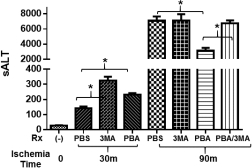Ischemia-Induced Endoplasmic Reticulum Stress Regulates Autophagy to Determine the Severity of Liver Ischemia Reperfusion Injury
H. Zhou,1,2 J. Zhu,1 S. Yue,1 R. Busuttil,1 J. Kupiec-Weglinski,1 Y. Zhai.1
1The Dumont-UCLA Transplant Center, UCLA, Los Angeles, CA
2Liver Transplant Center, The First Affiliated Hospital of Nanjing Medical University, Nanjing, Jiangsu, China.
Meeting: 2015 American Transplant Congress
Abstract number: B77
Keywords: Ischemia, Liver, Metabolic complications, Mice
Session Information
Session Name: Poster Session B: Ischemia/Reperfusion Injury: Strategies To Minimize Ischemia Reperfusion Injury
Session Type: Poster Session
Date: Sunday, May 3, 2015
Session Time: 5:30pm-6:30pm
 Presentation Time: 5:30pm-6:30pm
Presentation Time: 5:30pm-6:30pm
Location: Exhibit Hall E
Both endoplasmic reticulum (ER) stress and autophagy have been implicated in the pathogenesis of ischemia and reperfusion injury (IRI). As essential cellular stress responses against IR, questions as to whether and how these two processes interact in the development of liver IRI are not well defined. In a murine liver partial warm ischemia model, we studied the impact of ischemia time on ER stress and autophagy. Chemical chaperon 4-phenylbutyrate (4-PBA) or autophagy inhibitor 3-methyademine (3-MA) was administered in vivo prior to the start of liver ischemia, and their effects on liver ER stress, autophagy and IRI were evaluated.
While both transient (30min.) and prolonged (90min.) ischemia triggered ATF6 branches of unfolded protein response (UPR), only transient ischemia activated autophagy. Prolonged ischemia inhibited autophagy induction and disrupted autophagy flux (LC3B II in the absence and presence of chloroquine at 60mg/kg, i.p. at -1h) , which was associated with degradations of Atg3, Atg5 and Beclin-1 as determined by Western blot analysis. Autophagy inhibition by 3-MA resulted in an increase of liver IRI after transient, but not prolonged ischemia (Fig.30m vs. 90m 3MA groups). Alleviation of ER stress by 4-PBA restored liver autophagy after prolonged ischemia and protected livers from IRI. Autophagy inhibtion by 3-MA abrogated this liver protective effect of 4-PBA (Fig.90m PBA vs. PBA/3MA groups). Interestingly, the same 4-PBA treatment resulted in an increase of liver IRI after transient ischemia (Fig. 30m PBA group). Thus, ER stress played a critical role in regulating liver autophagy after IR. Transient ischemia resulted in a cytoprotective ER stress by increasing liver autophagy, while prolonged ischemia led to a cytotoxic ER stress associated with autophagy inhibition. Therapeutic targeting of ER stress should be cautioned because of its dual effects in the pathogenesis of liver IRI. 
To cite this abstract in AMA style:
Zhou H, Zhu J, Yue S, Busuttil R, Kupiec-Weglinski J, Zhai Y. Ischemia-Induced Endoplasmic Reticulum Stress Regulates Autophagy to Determine the Severity of Liver Ischemia Reperfusion Injury [abstract]. Am J Transplant. 2015; 15 (suppl 3). https://atcmeetingabstracts.com/abstract/ischemia-induced-endoplasmic-reticulum-stress-regulates-autophagy-to-determine-the-severity-of-liver-ischemia-reperfusion-injury/. Accessed January 25, 2026.« Back to 2015 American Transplant Congress
